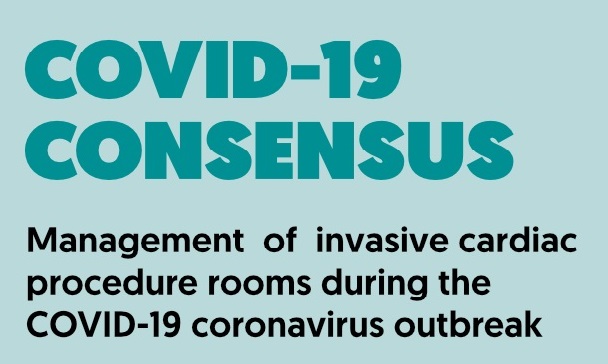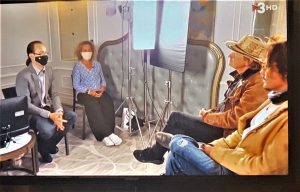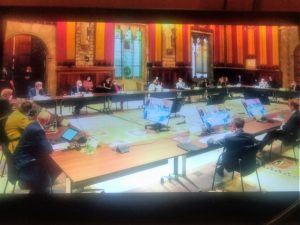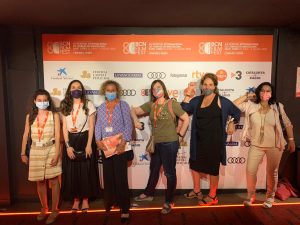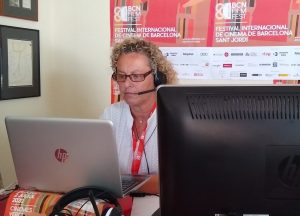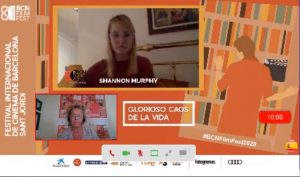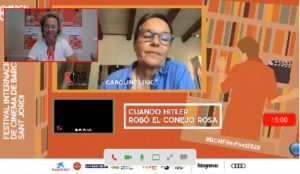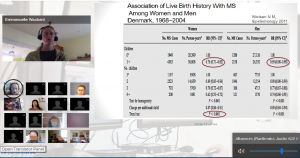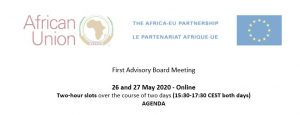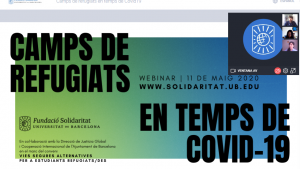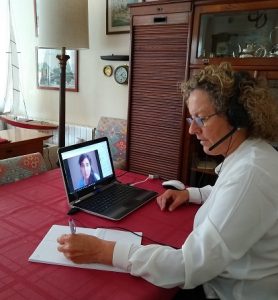Conference interpreter during the San Sebastian Film Festival
Johnny Depp has presented this weekend in San Sebastian, in the framework of the Festival, the film ‘Crock of Gold’, a film in which as a producer he narrates the life of his friend, composer and Irish poet Shane MacGowan, under the direction of Julien Temple.
Depp’s intention with this documentary is that the public will definitely know who Shane MacGowan is and what his legacy is.
The actor referred to his Irish friend “as one of the greatest poets of any period in history and a special person”. Depp praised his partner during the press conference: “I’m lucky to know that kind of greatness, I fell in love with him from the very first moment. He is not interested in beeing a celebrity. He is irreverent, stubborn, biting and funny” he added.
Depp is in the film itself with MacGowan, first drinking with him and then playing the guitar at the tribute concert he and celebrities like Bono, Nick Cave and Bobby Gillespie gave him. The director Julien Temple, who has directed the documentaries of the Sex Pistols, The Rolling Stones and Marvin Gaye, explains that he was interested in guiding this production “so that the children know and understand what has happened between Ireland and the United Kingdom”.
On the other hand, Florian Zeller, a brilliant novelist and dramaturg whose work has been translated into several languages, has presented “The Father”, an adaptation to the big screen with which he makes his debut as a director.
The Father’ tells the story of Anthony (Anthony Hopkins), a man of almost 80 years of age who lives alone in his London flat and who refuses every nurse that his daughter, Anne (Olivia Colman), hires to help him at home. Anne is desperate because she can no longer visit him on a daily basis and feels that her father’s mind is beginning to fail and she is becoming more and more disconnected from reality. As the plot progresses, however, Anne’s father will begin to doubt his loved ones, his own mind.
On-line interpreting during the Barcelona Film Fest 2020
The BCN Film Fest 2020 completed its fourth edition with more than 8000 viewers and has already announced its next edition between the 15th and the 23rd of April 2021.
Its director, Conchita Casanovas, has considered these figures a resounding success taking into account the 50% capacity restrictions in all the sessions to guarantee the health measures imposed against the coronavirus.
Thanks to the public’s acceptance of the proposals offered by the Festival, it has been possible to fill the halls in an edition that has counted on the participation – in person or virtually – of top international celebrities, thus taking another step forward in the consolidation of this annual event.
A total of 44 films have been screened – 16 in the official section – and the winners have been:
The Best Film Award went to the new film by the British director and scriptwriter William Nicholson with “Hope Gap”.
The Critics’ Award and Best Music Award to “Corpus Christi” by Jan Komasa.
The award for Best Screenplay went to Shaun Grant for “True Story of The Kelly Gang”,
The award for Best Actor went to Josh O’Connor for “Hope Gap”,
The award for Best Actress went to Rosamund Pike for “Radioactive”.
On-line interpreting during the Webinar on Multiple Sclerosis and Pregnancy
We have started a series of medical webinars on multiple sclerosis and pregnancy.
Multiple sclerosis is a common neurodegenerative disease in young patients of reproductive age; pregnancy has always been controversial, given the need for pharmacological management, the risk of relapse and the resulting disability.
This series of webinars on multiple sclerosis and pregnancy aims to shed light on the prospects of these patients who wish to start a family and to solve the doubts of many specialists who wish to offer them the best solutions within their reach.
On-line interpreting during the Seminar on Refugee Camps in times of Covid-19
The UB Solidarity Foundation organised a second webinar on responses to the pandemic in the refugee camps. The event was attended by Mª Jesús Vega Pascual, Head of communication at the United Nations High Commissioner for Refugees, Lorraine Lette; a lawyer at the Lesbos Legal Center and the testimony of Congolese student, Roger Subira, selected by the Universitat Refugi programme who was unable to reach Catalonia when lockdown and the state of alarm was declared in Spain.
Roger is currently following the transition course to the University of Barcelona from the refugee camp where he lives in Uganda. Among other problems Roger highlighted: the lack of access to computers, the lack of access to internet, the cuts in the electricity network, the saturation of the refugee camp. Many depend on the United Nations World Food Programme’s donation of less than $60 per person per month, as they cannot travel to other activities for their livelihoods.
In the refugee camp he pointed to cases of domestic violence affecting women and children without the authorities intervening, malnutrition and poverty, increased crime rates and unwanted pregnancies among adolescents.
On-line interpreting for Sala Virtual de Cine
Today, 17 April, the Virtual Cinema Room was opened, a platform promoted by the distribution company A Contracorriente Films to showcase the premieres that were to come to the big screen this season. La vie scolaire, based on the directors’ own experiences, tells the story of Samia, a young teacher who takes over as head of studies in a school in the suburbs of Paris where she discovers the discipline problems and social reality that weigh on the neighbourhood.
It has been a pleasure to interview the directors, Mehdi Idir and Grand Corps Malade, in their respective confinements, from where they continue to work on new projects.
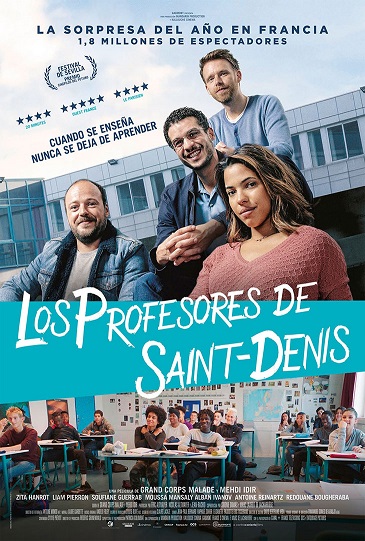
On-line interpreting during the Conference on COVID-19 and Heart Failure
Medical webinar given by Professor Magioni to a group of cardiologists in Ecuador and guidelines regarding the level of compliance, as well as implications for patient outcomes.
